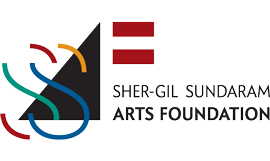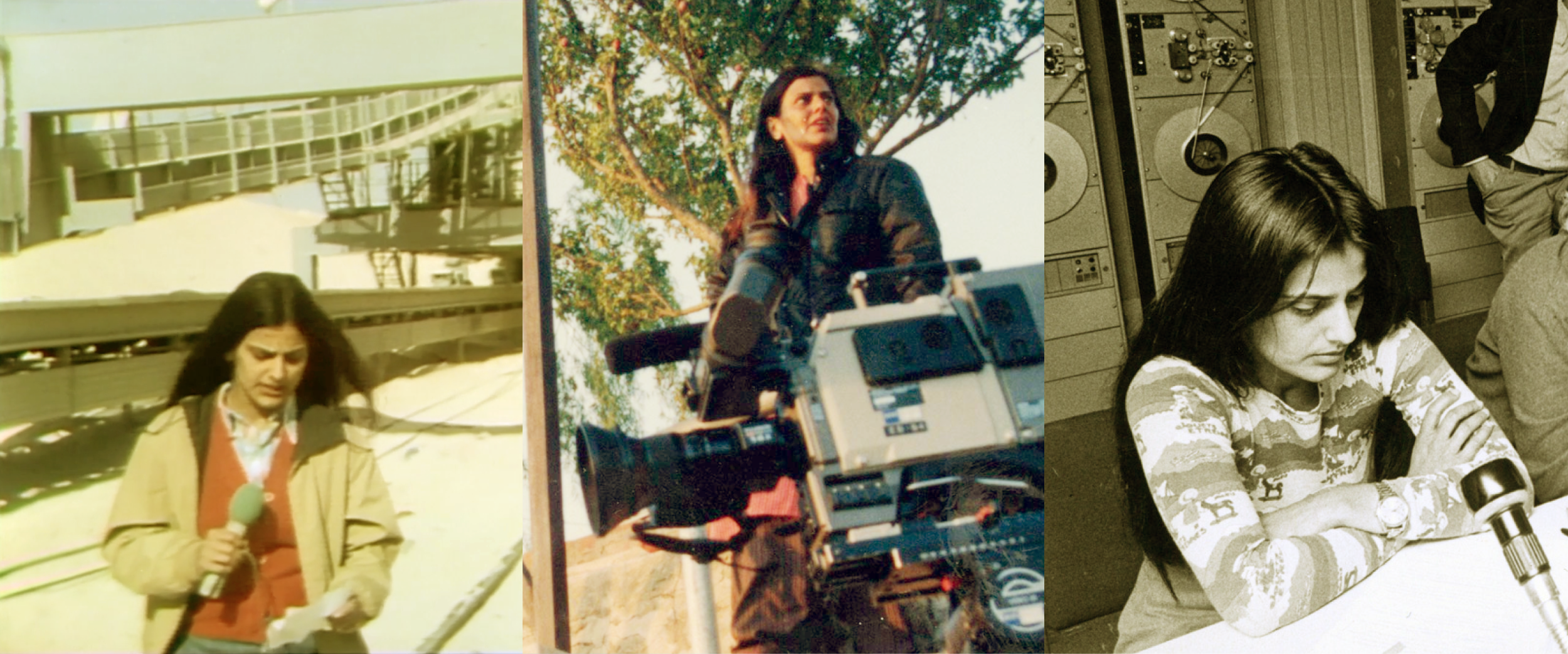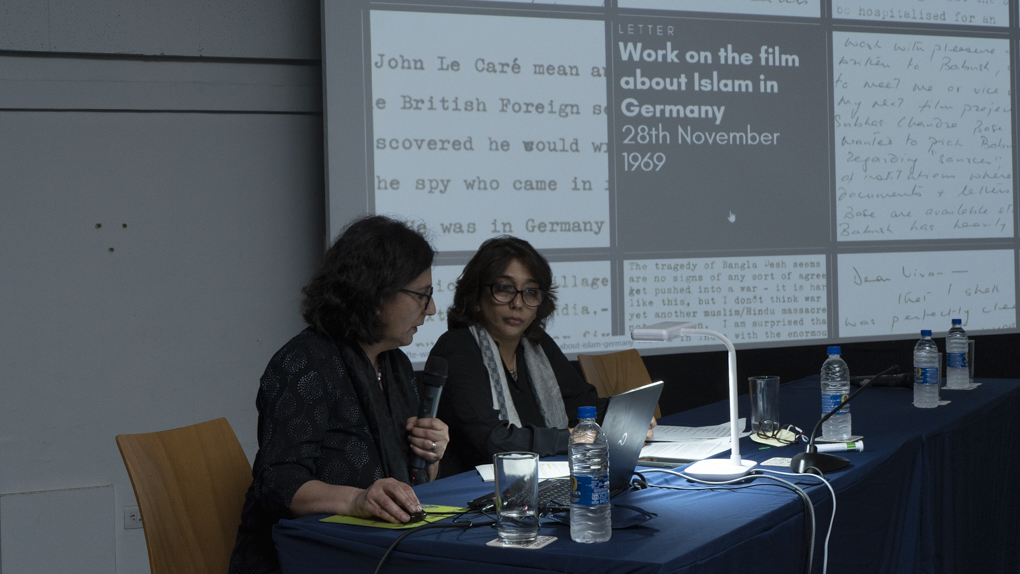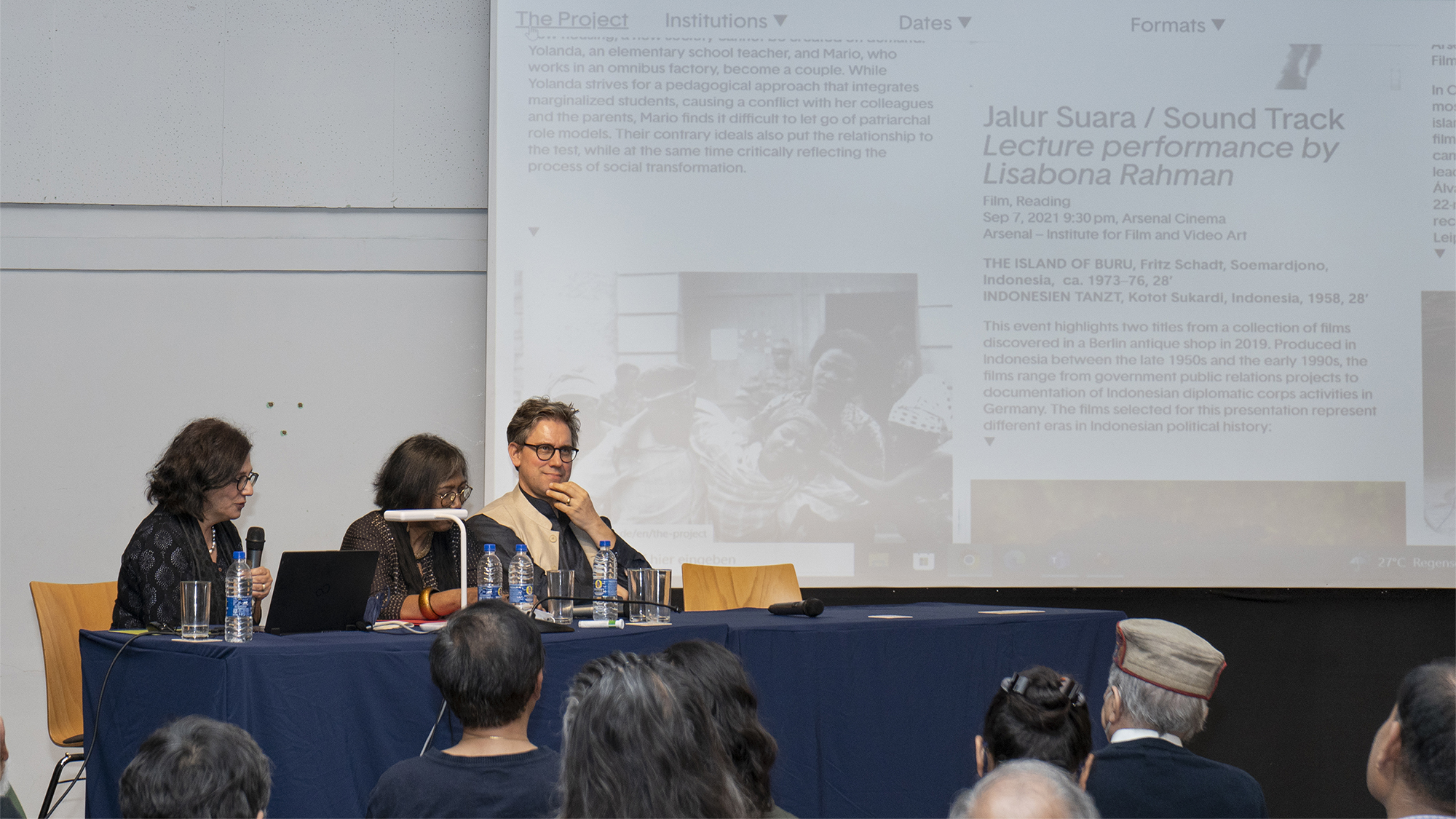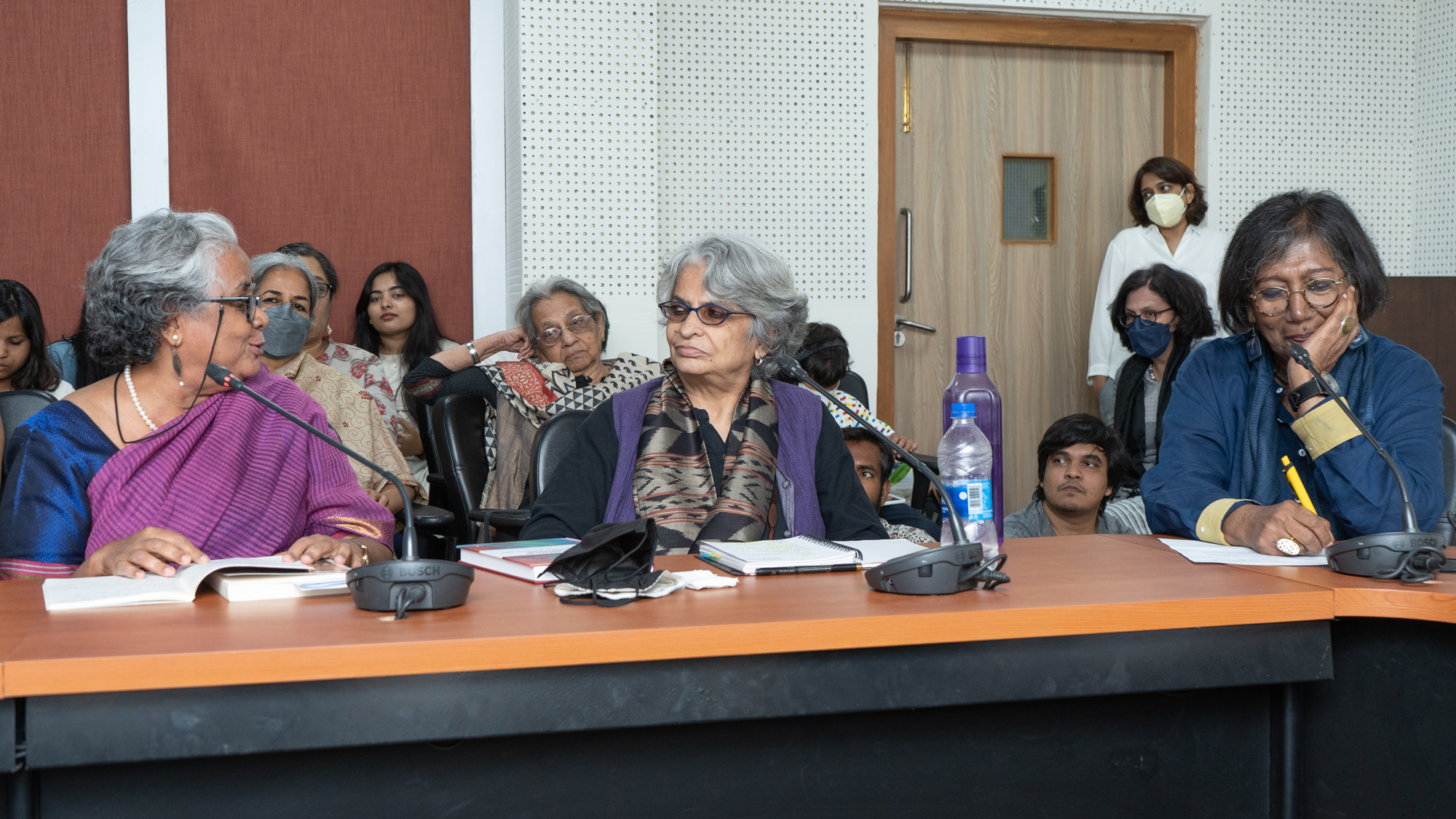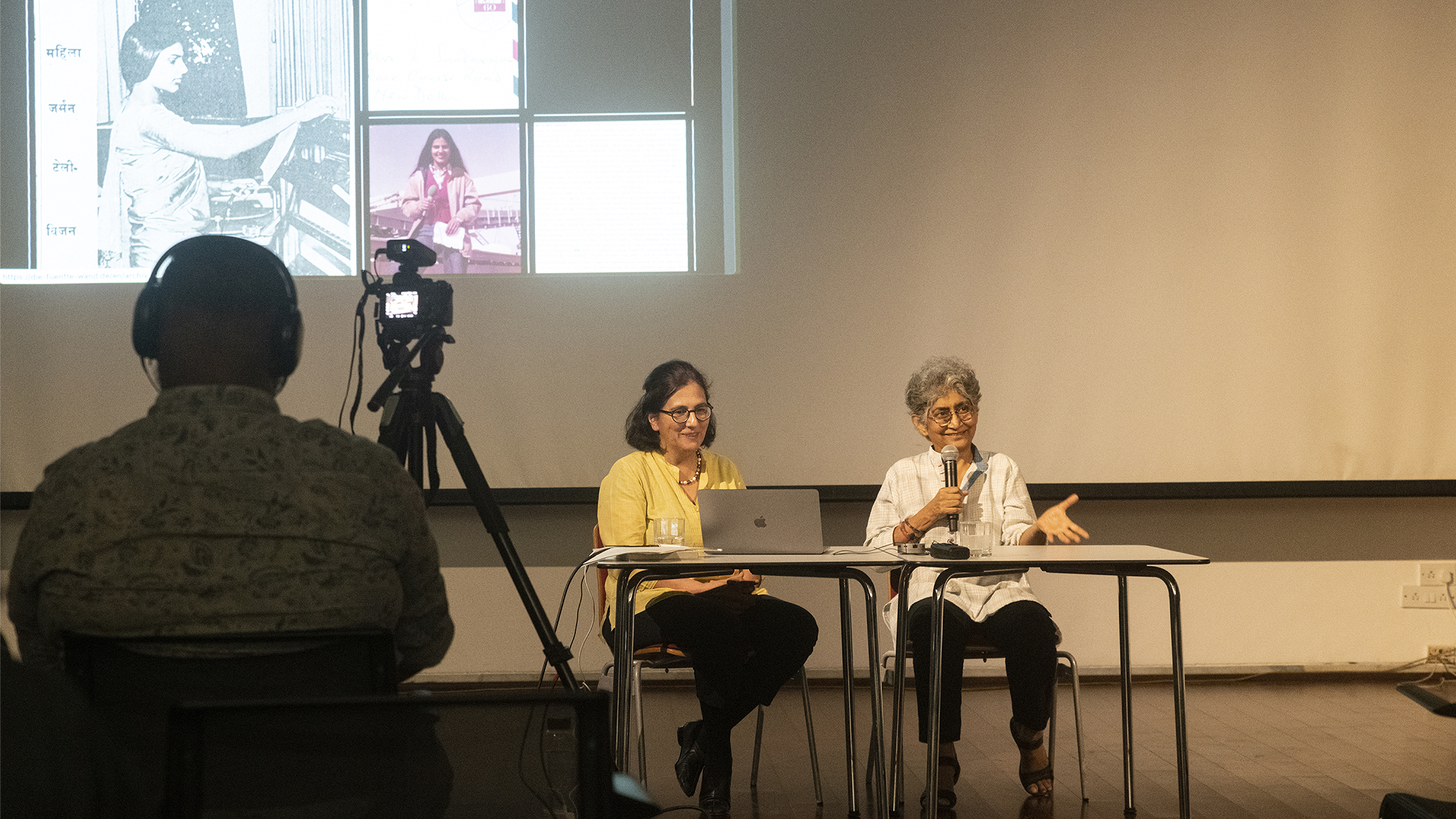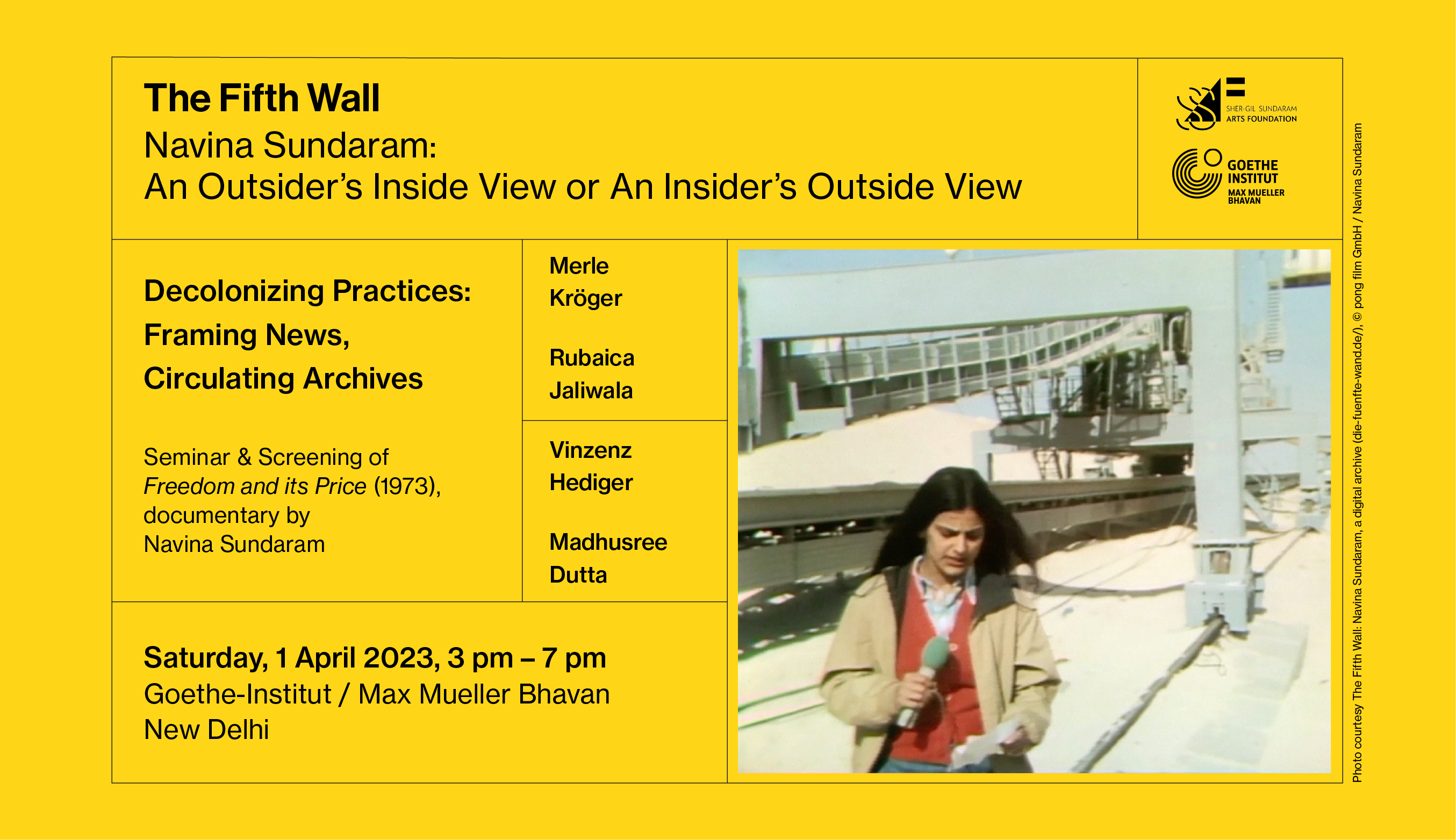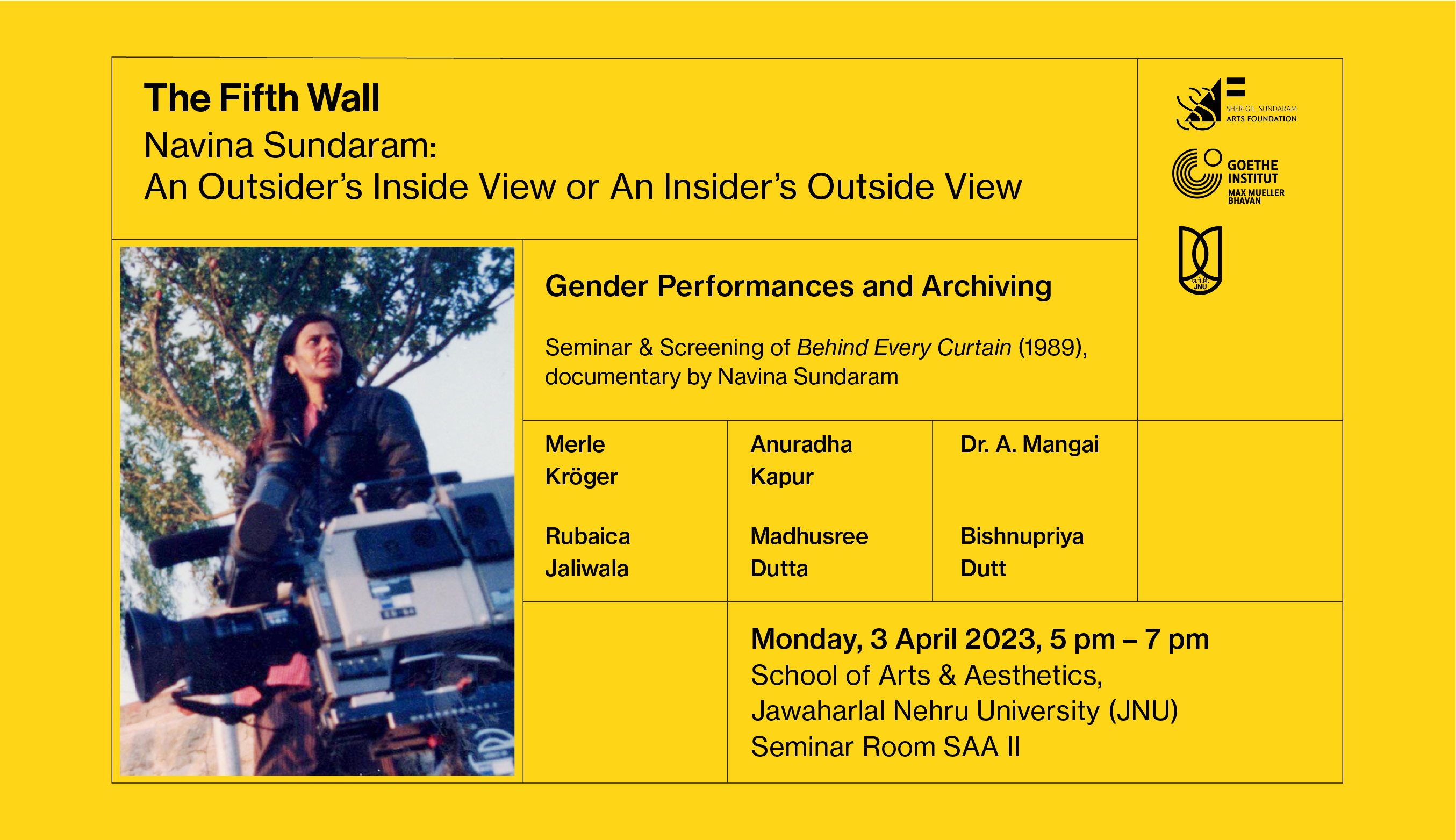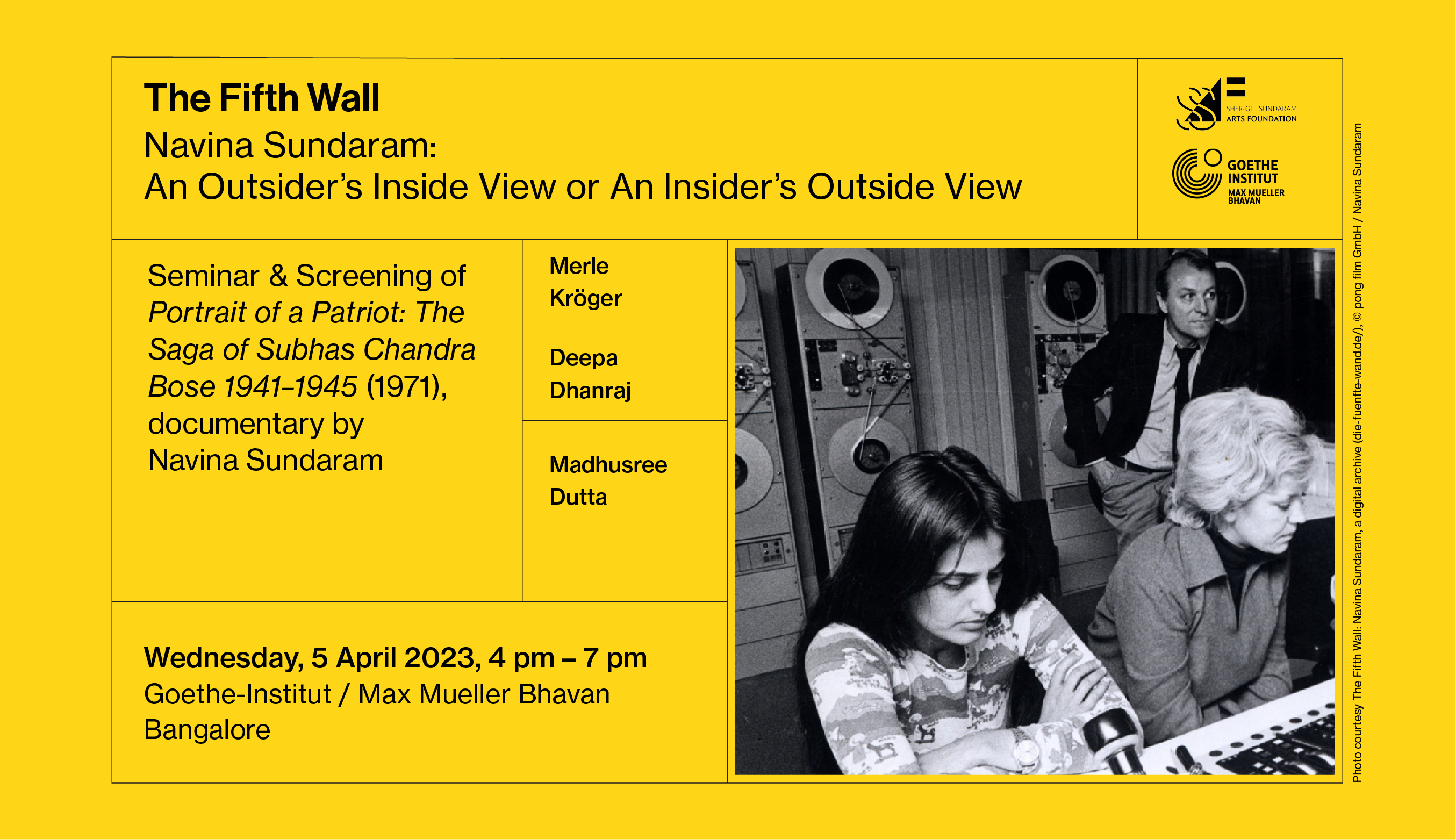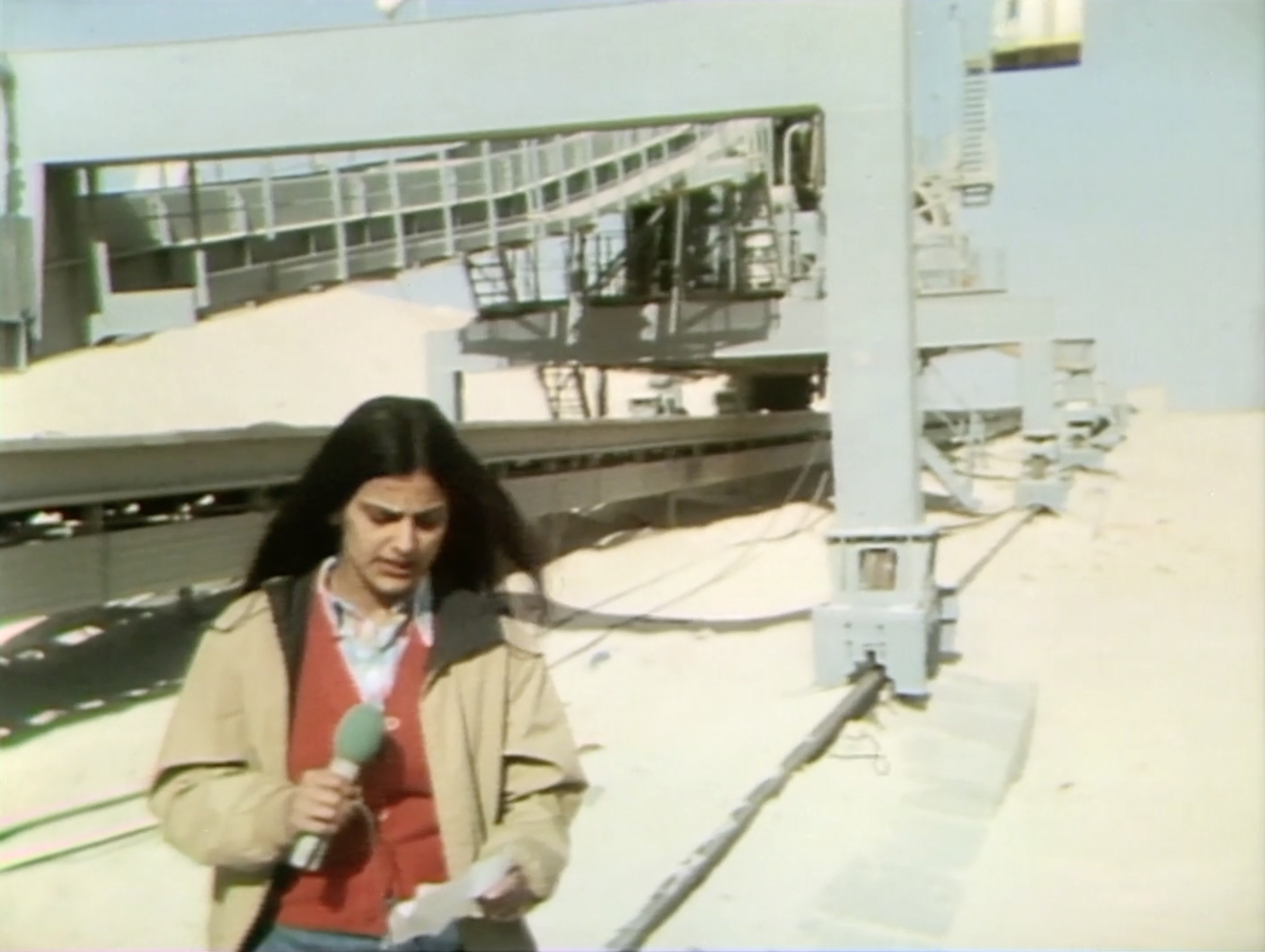
2023 | The Fifth Wall | Navina Sundaram: An Outsider’s Inside View or An Insider’s Outside View
The Fifth Wall
Navina Sundaram: An Outsider’s Inside View or An Insider’s Outside View
‘Tonight, as the two astronauts land on the moon, millions of television viewers will be watching, and actually, it is as far as Vietnam, which is across the room: the fifth wall.’ (Navina Sundaram, letter to her parents, 21.7.1969)
The digital archive The Fifth Wall gathers films, reportages, moderations, texts, letters and photos by the filmmaker and editor Navina Sundaram (1945–2022) from over 40 years of her work in television.
Sundaram grew up in New Delhi, India before going to Hamburg in 1964 for an internship at Norddeutscher Rundfunk (NDR). From 1970, she worked as a political editor for the broadcasting company. She has worked as a filmmaker, reporter and presenter for the programmes Weltspiegel, Gesichter Asiens, Panorama and extra drei, among others. From 1992–93, she was ARD correspondent and head of South Asia television in New Delhi. On leaving NDR, Navina Sundaram continued her work as an independent director of documentaries. Her research and reportage on international affairs and political histories reflect her vantage position at the crossroads of critical postcolonial voices emerging from the global South and the post-war reorganization of western Europe, specifically Germany. She has also authored numerous texts and lectures.
Sourced from the archives of German public-service broadcasters (ARD) and Sundaram’s private archive, The Fifth Wall is a curated look at German migration and media history. Sundaram is thus the prime focus as an author who takes a journalistic stand: on internationalism and decolonization, the question of class, racism, immigration, on Indian and German politics.
As the doors of the public broadcasting services in Germany open to a diverse public, new models of future archival practice have to be devised to make an immense treasure trove of educational and historical content accessible.
The Fifth Wall was conceptualized and developed by Merle Kröger and Mareike Bernien (pong film) in collaboration with Navina Sundaram within the framework of Archive außer sich. Archive außer sich is a project of the Arsenal – Institute for Film and Video Art e.V. in cooperation with the Haus der Kulturen der Welt, funded by the BKM (Federal Agency for Culture and the Media).
The Fifth Wall was funded by Federal Agency for Civic Education (German version), Goethe Institute and the Sher-Gil Sundaram Arts Foundation (English version).
Translation: Rubaica Jaliwala
Subtitling: anticlock films
Merle Kröger, novelist and film author, lives in Berlin. Together with the filmmaker Philip Scheffner, she has been making feature documentary films since 2007. In her novels, Kröger combines historical research, personal history and political analysis with elements of crime literature. As a curator of the transnational cultural project Import Export: Cultural Transfer between India and Germany, Austria (2005), she began a long-term collaboration with Navina Sundaram.
Mareike Bernien lives in Berlin and works as a filmmaker and lecturer in the field of filmic research and critical archival practices. A research-based approach determines her work, in which questions of memory politics and media archaeology are negotiated. Her recent works include: Sun Under Ground (2022) and Tiefenschärfe (2017) with Alex Gerbaulet. She has been a part of the production platform pong for several years and works here with Merle Kröger, among others, on the archival project The Fifth Wall.
Rubaica Jaliwala, freelance editor and translator of literary, art and cultural texts and books, lives in Mumbai and Berlin. As trainer and educational advisor, she has led workshops on intercultural learning and diversity, anti-racism and gender on four continents. She has collaborated with pong film since 2005 on the German–English translation of film subtitles, essays, novels and the entirety of The Fifth Wall, including its films, reportages and commentaries. She has also voiced excerpts of Navina Sundaram’s letters for audio recordings.
Decolonizing Practices: Framing News, Circulating Archives
Saturday, 1 April 2023, 3 pm – 7 pm
Goethe-Institut / Max Mueller Bhavan New Delhi
Archives deal with found materials and their annotation. Both these aspects are deeply attached to production conditions and infrastructures for access. And those, in turn, have been influenced by multiple kinds of colonizing schemes. Contemporary archiving campaigns are designed as action strategies to decolonize these hegemonic practices.
Programme
3.00 – 4.30 pm: Introduction into the digital archive The Fifth Wall and website walkthrough along the axis of decolonization by Merle Kröger and Rubaica Jaliwala
4.30 – 4.45 pm: Tea break
4.45 – 5.30 pm: Screening of Freedom and its Price, documentary by Navina Sundaram, 1973, 43 min.
5.30 – 7.00 pm: Discussion | Archiving as Actions: Vinzenz Hediger, Madhusree Dutta and Merle Kröger
7.00 pm: Reception at Goethe-Institut / Max Mueller Bhavan New Delhi
Film Synopsis
Freedom and its Price
25 July 1973 | 43 min. 14 s.
In her second major feature on postcolonial political conditions in South Asia, Navina Sundaram visits the young nation of Bangladesh shortly after its founding. The film begins in a military hospital for young war veterans and questions the price paid for hard-won freedom after the separation from Pakistan. Without any archival footage and using only original recordings and interviews, Sundaram narrates in modern documentary form the story of Bengali nationalism as the strongest political force in the region against the backdrop of colonial history. The freedom struggle is embodied by the ‘father of the nation’, the elected president Sheikh Mujibur Rahman, and the four pillars of his politics: nationalism, democracy, socialism and secularism. Sundaram traces the implementation of these paradigms in encounters with Hindu and Muslim groups: with migrants from Bihar, farming families and cooperatives. World politics is reflected in the fate of the young nation – Russian, Chinese, Indian and US interests determine Bangladesh’s present.
Participants
Madhusree Dutta is a filmmaker, curator and author living Mumbai and Berlin. She prefers to call herself a cultural producer. She was the executive director of Majlis Culture Centre in Mumbai (1990–2016 and artistic director of Academy of the Arts of the World (ADKDW) in Cologne, Germany in (2018–2021). She has initiated several public art and archive projects within and outside Majlis and ADKDW.
Vinzenz Hediger is professor of cinema studies at Goethe University Frankfurt am Main, where he directs the Graduate Research Training Program ‘Konfigurationen des Films’ (www.konfigurationen-des-films.de). He is a co-speaker of ‘ConTrust – Trust in Conflict’, an interdisciplinary research initiative in the Normative Orders research centre at Goethe University. He is a co-founder of NECS – European Network of Cinema and Media Studies and the founding editor of the Zeitschrift für Medienwissenschaft (www.zfmedienwissenschaft.de).
Gender Performances and Archiving
Monday, 3 April 2023, 5 pm – 7 pm
School of Arts & Aesthetics, Jawaharlal Nehru University (JNU)
Seminar Room SAA II
Prior to the preeminence of sticks, swords and the Hero’s long, hard, killing tools, our ancestors’ greatest invention was the container: the basket of wild oats, the medicine bundle, the net made of your own hair, the home, the shrine, the place that contains whatever is sacred. The recipient, the holder, the story. The bag of stars. – Ursula Le Guin
Feminist archiving practice is the development of skills to find, bring into light, to incubate and also to materialise the structures underlying the choice to conceal or to reveal.
Programme
4.30 – 5.00 pm: Tea
5.00 – 5.45 pm: Introduction to the digital archive The Fifth Wall by Merle Kröger and website walkthrough along the axis of feminism by Rubaica Jaliwala
5.45 – 6.30 pm: Screening of Behind Every Curtain documentary by Navina Sundaram, 1989, 43 min.
6.30 – 7.15 pm: Discussion | Making Performances, Documenting Performances: Anuradha Kapur, Madhusree Dutta and Dr. A. Mangai, moderated by Bishnupriya Dutt
Film Synopsis
Behind Every Curtain
14 October 1989 | 43 min. 43 s.
Broadcast Series: III International
In this feature for ‘III International’, Navina Sundaram returns to her family home in Kasauli in northern India six years after she shot her film Summer Guests there. For the summer, the artist Vivan Sundaram has made the Kasauli Art Centre available to a group of theatre practitioners and representatives from literature, art, music and feminist theory. The funding is from India; development aid from the West is deliberately avoided. With the title ‘Nayika Bhed’, a play is being developed for the specially constructed open-air stage against the backdrop of the Himalayas. The group, led by theatre professor and director Anuradha Kapur, is developing a scenic manifesto from biographical stories that combines mythological female figures with contemporary theories of feminism. They want to shift patriarchal emphases, annotate history and create a new theatre-form between self-representation and agitprop. Thus, the story is channelled through the figure of Mahadevi Akka, the passionate 12th-century poet–saint who sheds her clothes and confronts the world with her erotic poetry. The summer ends with a certainty: the silence is broken.
Participants
Anuradha Kapur is a theatre maker and teacher. Her plays have travelled nationally and internationally, and she has taught in universities in India and abroad. She is the founder of Vivadi, a working group of theatre makers, visual artists, filmmakers, musicians and writers. She won the Sangeet Natak Akademi award for Direction in 2004. Anuradha Kapur completed her term as Director, National School of Drama, New Delhi, in 2013. She is presently Visiting Professor at Ambedkar University Delhi.
Madhusree Dutta is a filmmaker, curator and author living Mumbai and Berlin. She prefers to call herself a cultural producer. She was the executive director of Majlis Culture Centre in Mumbai (1990–2016 and artistic director of Academy of the Arts of the World (ADKDW) in Cologne, Germany in (2018–2021). She has initiated several public art and archive projects within and outside Majlis and ADKDW.
Mangai is the pseudonym of Dr V. Padma. She is a retired professor in English from Stella Maris College, Chennai. She has been actively engaged in Tamil theatre as an actor, director and playwright for close to four decades. She has been a founding member of Chennai Kalai Kuzhu, Sakthi, Palkalai Arangam, Voicing Silence and Marappachi. Her fields of interest are theatre, gender and translation studies.
Bishnupriya Dutt is Professor of Theatre and Performance Studies in the School of Arts and Aesthetics, JNU. Her area of research includes politics and theatre, feminist readings of Indian Theatre, and contemporary performance practices and popular culture. Her most recent publication is Maya Rao and Indian Feminist Theatre (Cambridge, 2022). She is currently the Vice President of the International Federation for Theatre Research. Bishnupriya has been involved in active theatre in Calcutta since 1960s with the Little Theatre Group and later People’s Little Theatre, where she performs and directs.
Seminar and Film Screening
Wednesday, 5 April 2023, 4 pm – 7 pm
Goethe-Institut / Max Mueller Bhavan Bangalore
Programme
4.00 – 4.45 pm: Introduction to the digital archive The Fifth Wall and website walkthrough along the axis of Media Ethics and Political Potentials by Merle Kröger
4.45 – 5.15 pm: Discussion on The Idea of Present in Archiving Projects: Deepa Dhanraj and Merle Kröger
In the recent shift from facilitating simple reservoirs of material and information to curating diverse and tangential narratives around the potential of the past, the endeavours of building archives have turned into vibrant political and artistic actions. This idea will be discussed in the context of The Fifth Wall and Yugantar Film Collective.
5.15 – 5.30 pm: Tea break
5.30 – 6.15 pm: Screening of Portrait of a Patriot: The Saga of Subhas Chandra Bose 1941–1945, documentary by Navina Sundaram, 1971, 44 min.
6.15 – 6.45 pm: Discussion with Merle Kröger and Madhusree Dutta and Q&A with the audience
7.00 pm: Reception at the Goethe-Institut/ Max Mueller Bhavan
Participants
Deepa Dhanraj is a researcher, writer and documentary filmmaker. She was one of the founding members of Yugantar, a feminist film collective that made films centring the political organizing of women domestic and factory workers. She is a founding member of The Oral History Association of India. She is co-author, with K. Lalita, of Rupture, Loss and Living: Minority women speak about post conflict life (2016) – a collection of oral narratives of Muslim women survivors of sectarian violence. Dhanraj is currently working on an audio-visual archive of the anti-caste students’ movement that arose in 2016 after the suicide of the Dalit research scholar Rohith Vemula.
Madhusree Dutta is a filmmaker, curator and author living Mumbai and Berlin. She prefers to call herself a cultural producer. She was the executive director of Majlis Culture Centre in Mumbai (1990–2016 and artistic director of Academy of the Arts of the World (ADKDW) in Cologne, Germany in (2018–2021). She has initiated several public art and archive projects within and outside Majlis and ADKDW.
Photo courtesy The Fifth Wall: Navina Sundaram, a digital archive (die-fuenfte-wand.de/), © pong film GmbH / Navina Sundaram
